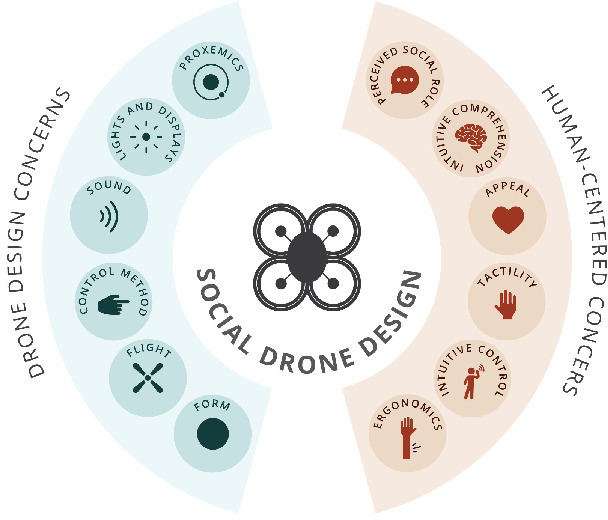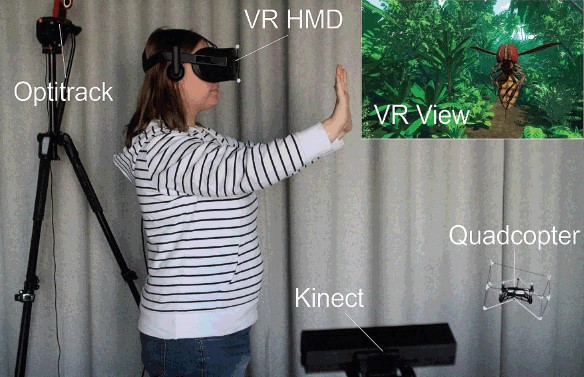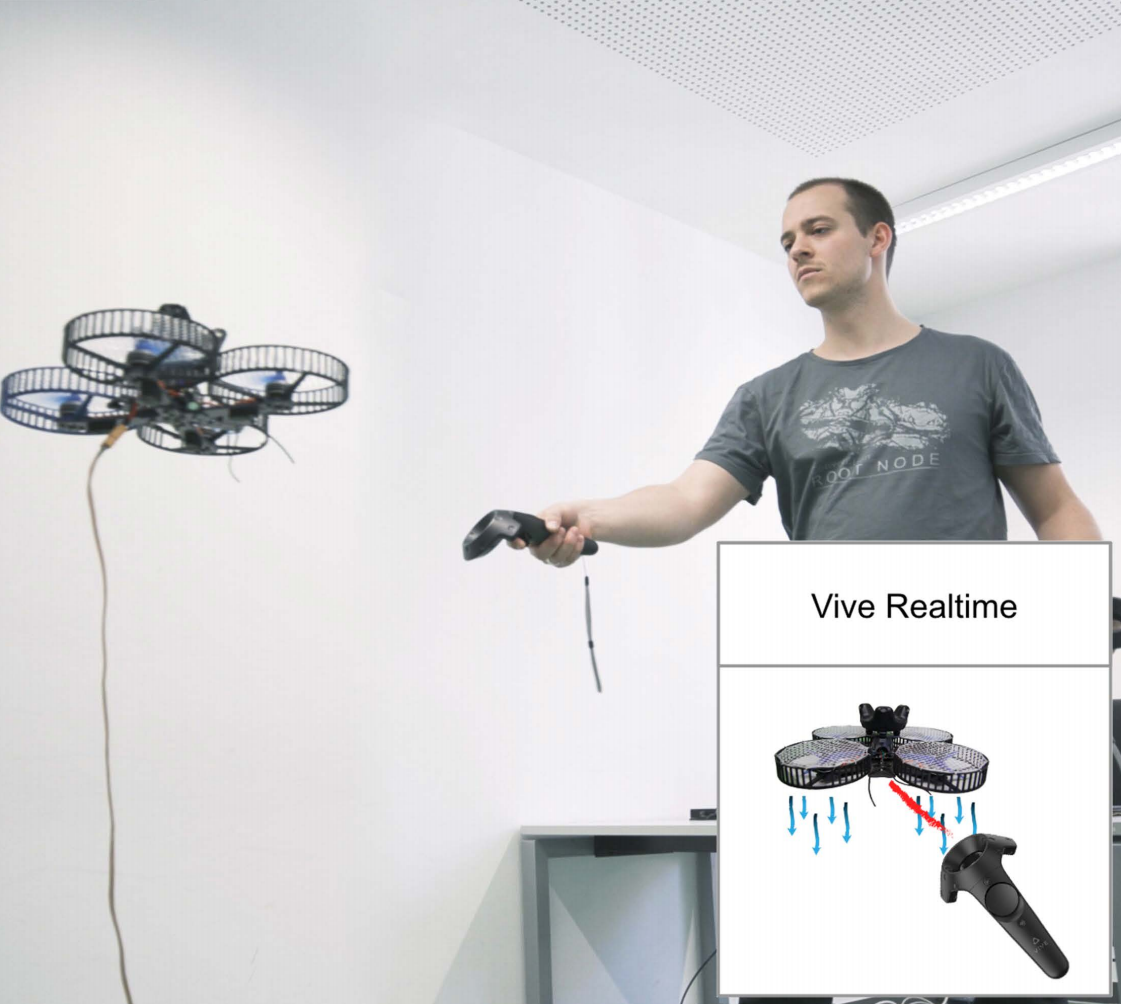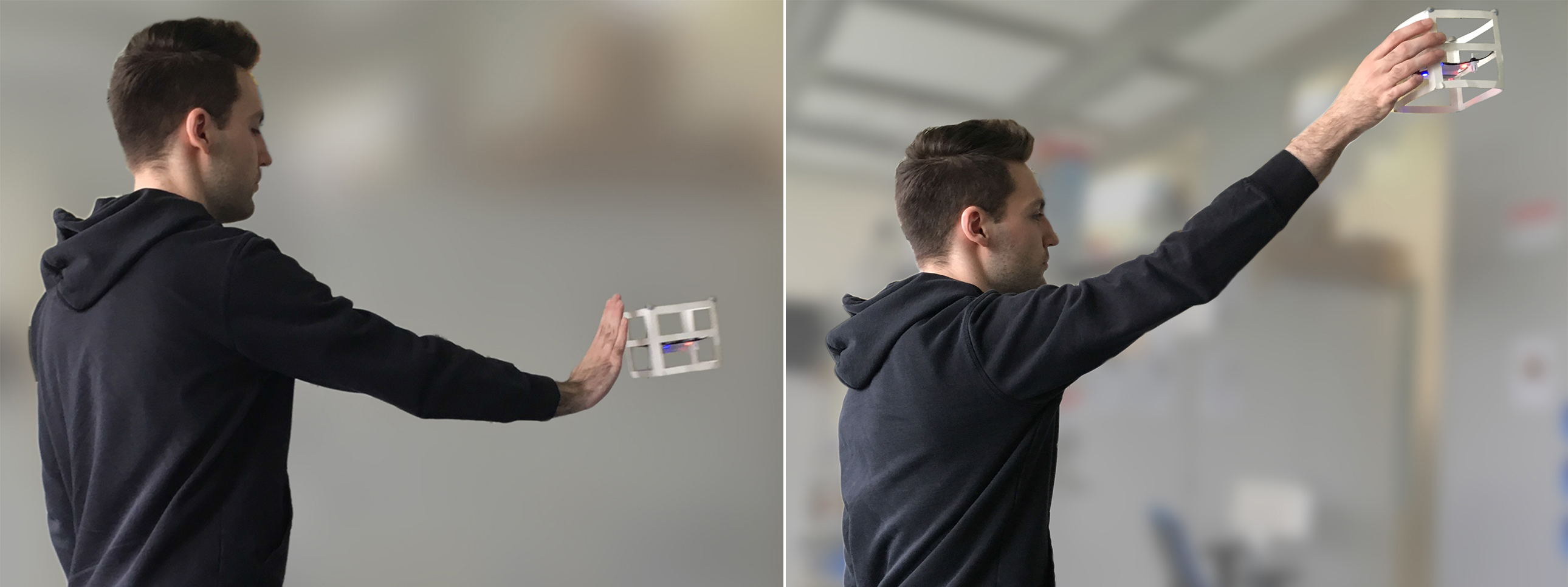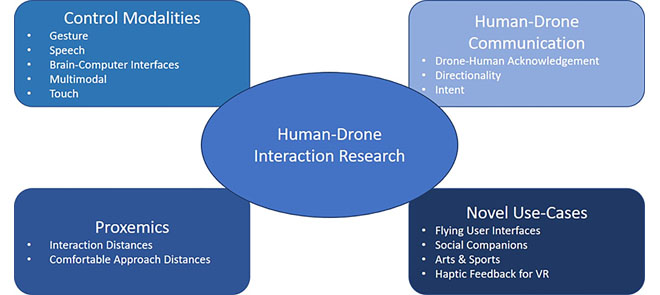The Interdisciplinary Workshop on Human-Drone Interaction (iHDI 2020) – part of the 2020 CHI Conference on Human Factors in Computing Systems (CHI '20) – is a gathering for scholars of human-drone interaction (HDI) and related subjects.
Human-drone interaction (HDI) is becoming an ubiquitous topic in daily life, and a rising research topic within CHI. Knowledge from many disciplines – design, engineering, social sciences, humanities... – can inform the design and study of HDI, making interdisciplinary communication essential. iHDI 2020 aims to bring together diverse perspectives, advancing HDI and its scholarship through discussions and activities involving an assortment of research and design approaches. The workshop intends to serve as a platform for an enduring community, towards results that take off.
Important Dates and Links
-
11 February 2020: Submissions due
18 February 2020: Submissions dueSubmit at: easychair.org/conferences/?conf=ihdi2020Submission format: CHI Extended Abstracts Format
- 28 February 2020: Authors notified of acceptance
-
25 April 2020: Proceedings published
- Proceedings hosted at: TBA
- 26 April 2020: Workshop
NOTICE
In response to the COVID-19 pandemic, CHI 2020 will not be held physically. Thus, we will not hold iHDI 2020 as a physical gathering. Authors of accepted contributions will be contacted with more information soon.

Call for Papers
Drones are becoming ubiquitous. Current applications include logistics, construction, security, emergencies, and photography. Emerging applications like exercise, companionship, and tangible user interfaces are active research topics within the CHI community.
Knowledge from a wealth of disciplines can inform new drone applications; and communication between different disciplines (design, engineering, social sciences, humanities...) is essential. To this end, the Interdisciplinary Workshop on Human-Drone Interaction (iHDI 2020) aims to intertwine diverse perspectives, as a platform for researchers and practitioners who learn from each other.
We seek high quality contributions exploring HDI from a plethora of perspectives, including but not limited to: empirical research, engineering, design, theory, art, and opinions.
Examples for topics include, but are not limited to, the following:
- Novel HDI experiences
- Theoretical and philosophical arguments on concepts and contexts
- Transferring learnings between HDI and other HCI or extracurricular topics
- Policy and regulatory issues
- Accessible HDI
- Prototyping and development tools
- Ethnographic fieldwork with users, developers, and bystanders
The submission deadline is 11 February 2020. Authors are invited to submit position papers, up to 6 pages (including references) in the CHI Extended Abstracts Format, at: easychair.org/conferences/?conf=ihdi2020
The proceedings will be stored on the open archive HAL CEUR Workshop Proceedings, indexed by Google Scholar. A paper on workshop outcomes will be submitted to a relevant venue. Selected contributions will be considered for publication in a special issue of the THRI journal.
At least one author must attend. Attendees must register for the workshop and at least one day of CHI 2020.
Workshop website: socialdrones.github.io/ihdi2020/
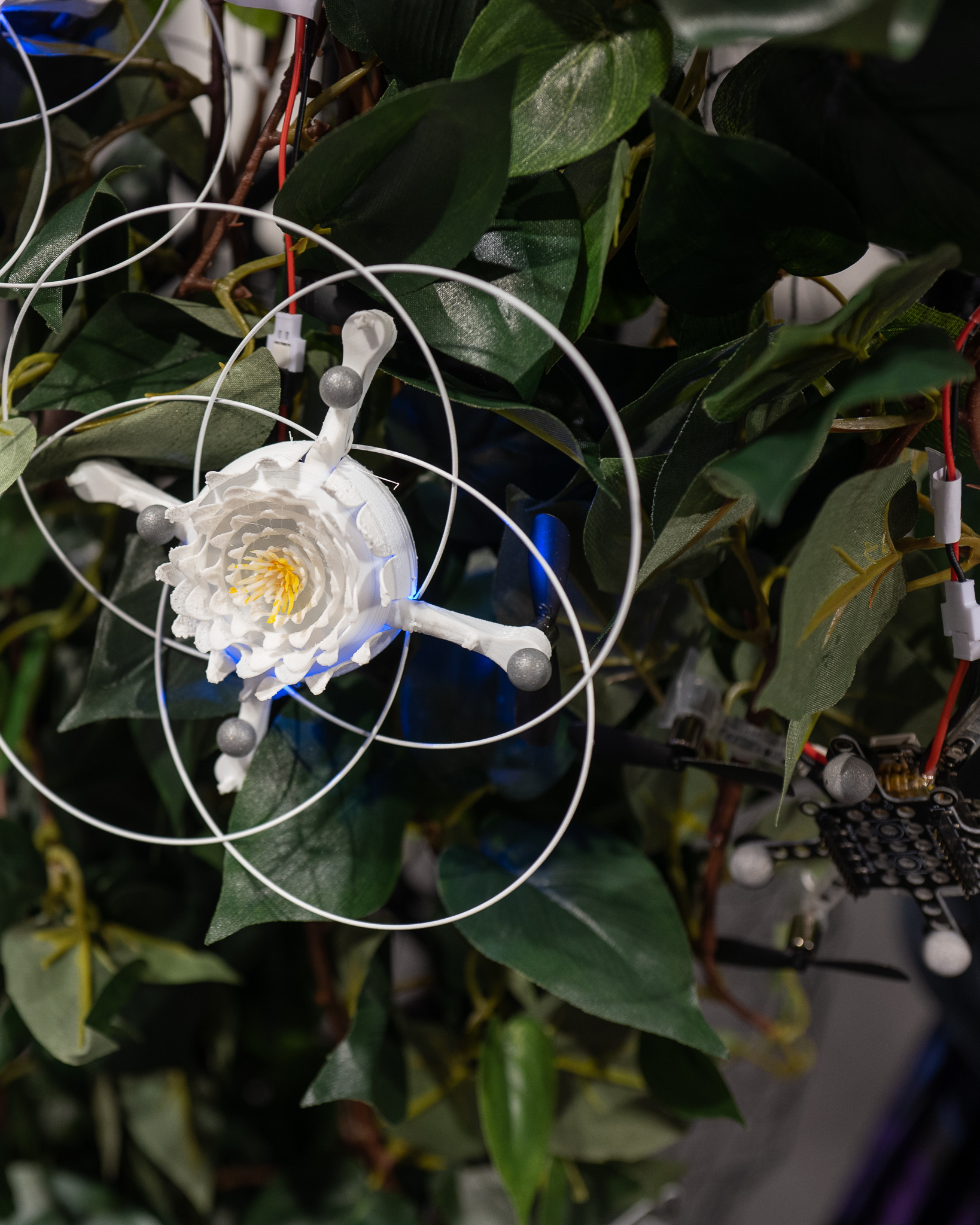
Workshop Program
15 min Opening
15 min Introduction and Ice-breaking
20 min Keynote
100 min Presentations and Posters
30 min Break
120 min Prototyping Activities
20 min Break
40 min Prototype Presentations and Discussin
30 min Summary and Closing
Afterwards Dinner and Networking
Post-Workshop Plans
Workshop papers will be stored on the open archive HAL CEUR Workshop Proceedings (indexed by Google Scholar). Papers will also be listed here on the workshop website, with links to the reposiory. A brief report on workshop activities, as well as selected photos and descriptions of outputs from the hands-on session (subject to creators’ permissions) will be published here on the workshop website. We also aim to explore other online platforms for continuous knowledge sharing, based on the preferences of the community.
A variety of post-workshop academic publications will beconsidered based on the content of the accepted submissions and the outputs of workshop sessions. These include but are not limited to: a report to be submitted to a venue that is relevant to the CHI community (e.g. ACM Interactions), full paper submissions to relevant SIGCHI conferences based on synergies between research efforts presented at the workshop, and scoping a special issue of ajournal based on research agendas articulated at the workshop. (The editors-in-chief of ACM THRI have been contacted regarding a HDI special issue.)
Related Work

Proceedings
Full proceedings available at: http://ceur-ws.org/Vol-2617/
-
Enhancing Social Experiences with Shared Drones
Sven Mayer, Piotr Ładoński, Julia Dominiak, Andrzej Romanowski, Paweł W. Woźniak, Lars Lischke -
Exploring the Use of Drones for Taking Accessible Selfies with Elderly
Yuan Yao, Weiwei Zhang, Soojeong Yoo, Callum Parker, Jihong Jeung -
ProxyDrone: Autonomous Drone Landing on the Human Body
Jonas Auda, Martin Weigel, Jessica Cauchard, Stefan Schneegass -
Agent Archetypes for Human-Drone Interaction: Social Robots or Objects with Intent?
Mehmet Aydın Baytaş, Sara Ljungblad, Joseph La Delfa, Morten Fjeld -
How We Own Drones: On the Sense of Ownership in the Drone Design
Anastasia Kuzminykh, Jessica Cauchard -
Let’s Fly! An Analysis of Flying FPV Drones Through an Online Survey
Dante Tezza, Derek Caprio, Denis Laesker, Marvin Andujar -
Human-Drone Interactions with Semi-Autonomous Cohorts of Collaborating Drones
Jane Cleland-Huang, Ankit Agrawal -
3D Tactile Obstacle Awareness System for Drones using a Tactile Interface around the Head
Oliver Beren Kaul, Michael Rohs -
Don’t Drone Yourself in Work: Discussing DronOS as a Framework for Human-Drone Interaction
Matthias Hoppe, Yannick Weiß, Marinus Burger, Thomas Kosch -
MaDrone: Using Drones to Facilitate Connectedness Across Geographic Boundaries
Mikołaj P. Woźniak, Sebastian Feger, Matthias Hoppe, Thomas Kosch, Stephanie Van de Sandt, Jakob Karolus, Luke Haliburton, Paweł W. Woźniak, Jasmin Niess -
Object-Centric Camera Drone Control for Unconstrained Telepresence
Jiannan Li, Ravin Balakrishnan, Tovi Grossman
Citation Info
Mehmet Aydın Baytaş, Markus Funk, Sara Ljungblad, Jérémie Garcia, Joseph La Delfa, and Florian ‘Floyd’ Mueller. 2020. iHDI 2020: Interdisciplinary Workshop on Human-Drone Interaction. In Extended Abstracts of the 2019 CHI Conference on Human Factors in Computing Systems (CHI EA '19). ACM, New York, NY, USA. DOI: https://doi.org/10.1145/3334480.3375149
@inproceedings{Baytas:2020:IIW,
author = {Bayta\c{s}, Mehmet Ayd{\i}n and Funk, Markus and Ljungblad, Sara and Garcia, J{\'e}r{\'e}mie and La Delfa, Joseph and Mueller, Florian `Floyd'},
title = {iHDI 2020: Interdisciplinary Workshop on Human-Drone Interaction},
booktitle = {Extended Abstracts of the 2020 CHI Conference on Human Factors in Computing Systems},
series = {CHI EA '20},
year = {2020},
isbn = {978-1-4503-6819-3/20/04},
location = {Honolulu, HI, USA},
url = {http://doi.acm.org/10.1145/3334480.3375149},
doi = {10.1145/3334480.3375149},
publisher = {ACM},
address = {New York, NY, USA},
}
Keynote: Drone Design and Ethics, in Performance

Kristina Höök
Organizers
 Mehmet Aydın Baytaş received his PhD from Koç University's interdisciplinary Design, Technology and Society program. He is a Marie Skłodowska-Curie Research Fellow at Qualisys AB, and a research affiliate at Chalmers University of Technology's t2i Lab. His current research addresses the design space of autonomous drones operating in human-populated environments.
Mehmet Aydın Baytaş received his PhD from Koç University's interdisciplinary Design, Technology and Society program. He is a Marie Skłodowska-Curie Research Fellow at Qualisys AB, and a research affiliate at Chalmers University of Technology's t2i Lab. His current research addresses the design space of autonomous drones operating in human-populated environments.
 Markus Funk is a senior user experience researcher at Cerence Inc, Germany. Markus is an expert in human-drone interaction and flying user interfaces.
Markus Funk is a senior user experience researcher at Cerence Inc, Germany. Markus is an expert in human-drone interaction and flying user interfaces.
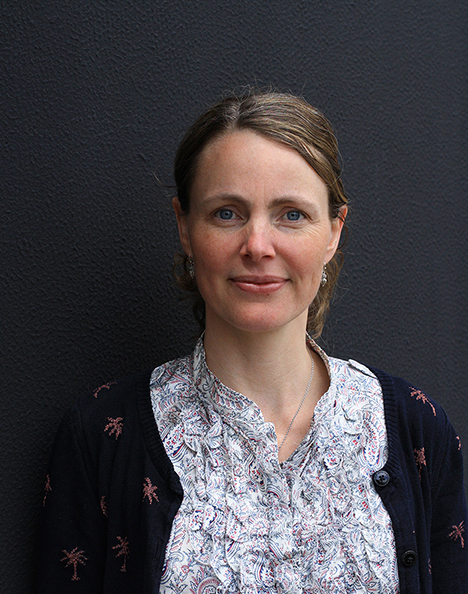 Sara Ljungblad is an Assistant Professor at the University of Gothenburg and Chalmers University of Technology. She is interested in inclusive design methods and has done several long-term studies understand experiences of robotic products in everyday settings. She is currently funded by WASP-HS to conduct constructive and critical design research on "social drones."
Sara Ljungblad is an Assistant Professor at the University of Gothenburg and Chalmers University of Technology. She is interested in inclusive design methods and has done several long-term studies understand experiences of robotic products in everyday settings. She is currently funded by WASP-HS to conduct constructive and critical design research on "social drones."
 Jérémie Garcia is an Assistant Professor at ENAC, Toulouse, France. He is interested in designing interactions to author and operate automated systems including drones and air traffic control.
Jérémie Garcia is an Assistant Professor at ENAC, Toulouse, France. He is interested in designing interactions to author and operate automated systems including drones and air traffic control.
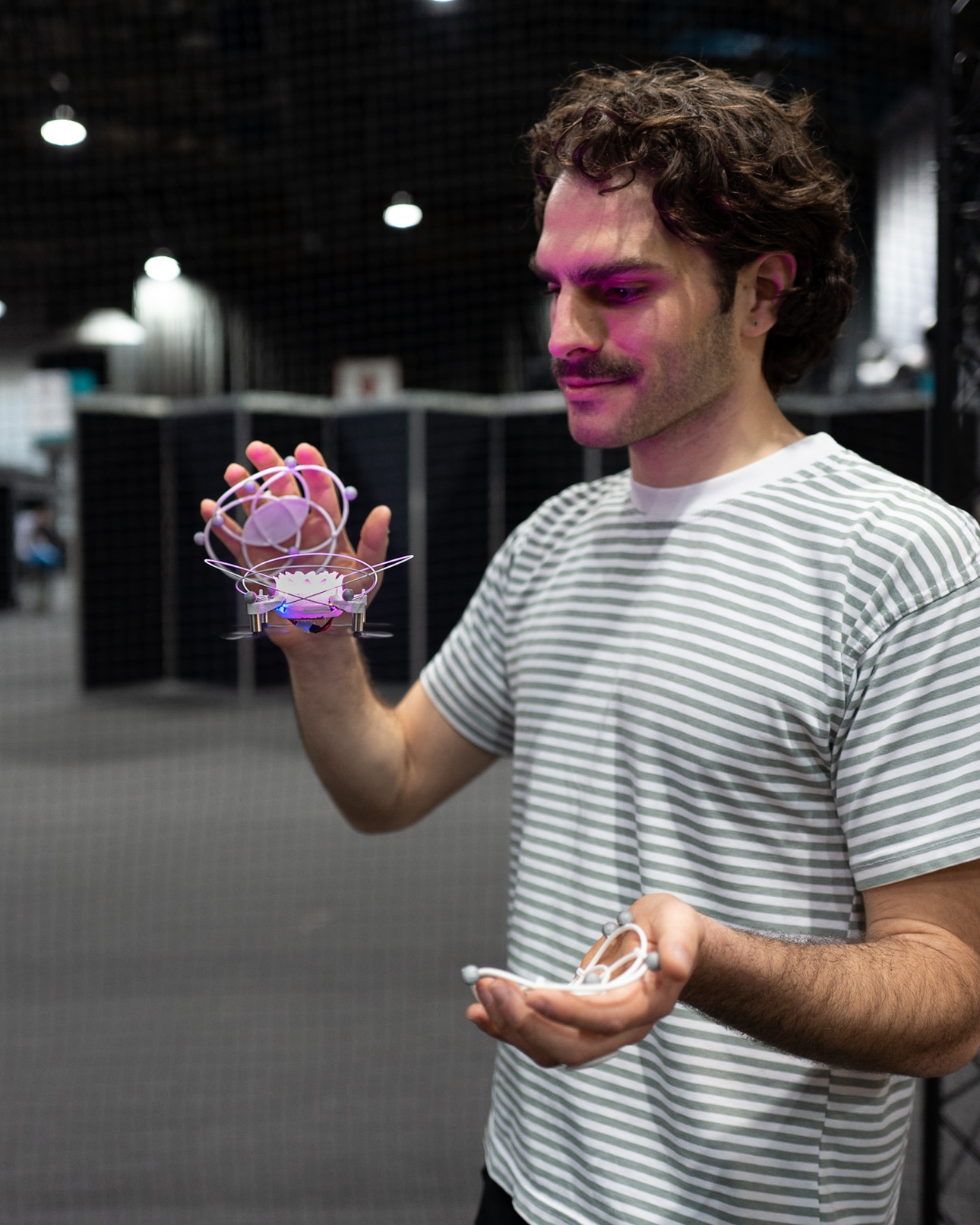 Joseph La Delfa is a PhD student in the School of Design at RMIT University. His research is focused on bodily awareness and reflection through HDI. His experiences in product design and engineering, from concept to production and maintenance, covers industries including glassware, hand tools, furniture, and service design.
Joseph La Delfa is a PhD student in the School of Design at RMIT University. His research is focused on bodily awareness and reflection through HDI. His experiences in product design and engineering, from concept to production and maintenance, covers industries including glassware, hand tools, furniture, and service design.
 Florian 'Floyd' Mueller is a Professor at Monash University, where he directs the Exertion Games Lab. His research straddles the intersection of human-computer interaction, the body, and gaming; including the use of drones in exercise and recreation.
Florian 'Floyd' Mueller is a Professor at Monash University, where he directs the Exertion Games Lab. His research straddles the intersection of human-computer interaction, the body, and gaming; including the use of drones in exercise and recreation.

